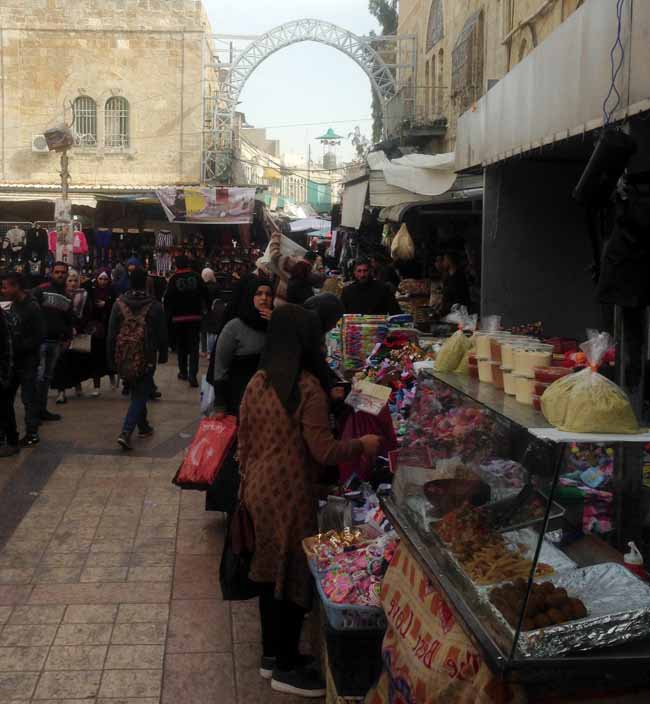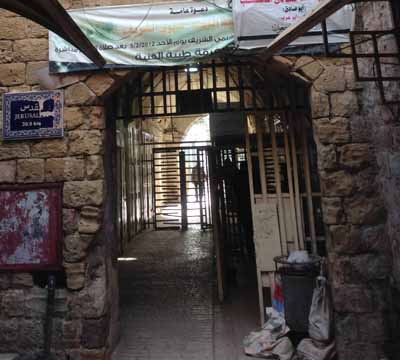 I spent my second day in Hebron walking around, taking pictures, getting a better sense of where everything was. I went through a couple of full-scale checkpoints with turnstiles and metal detectors, and others with just a couple of soldiers with automatic rifles, and wherever I went they waved me through with a smile, even when I set off the metal detectors — I was asked my nationality a couple of times and once asked for my passport, but just to see I had one, not to open it and check my photo… because I was obviously a tourist and everybody wants more of those.
I spent my second day in Hebron walking around, taking pictures, getting a better sense of where everything was. I went through a couple of full-scale checkpoints with turnstiles and metal detectors, and others with just a couple of soldiers with automatic rifles, and wherever I went they waved me through with a smile, even when I set off the metal detectors — I was asked my nationality a couple of times and once asked for my passport, but just to see I had one, not to open it and check my photo… because I was obviously a tourist and everybody wants more of those.
So, as I say, I was wandering all over, getting lost, retracing the same streets multiple times, exploring the old city, the Jewish settler area, 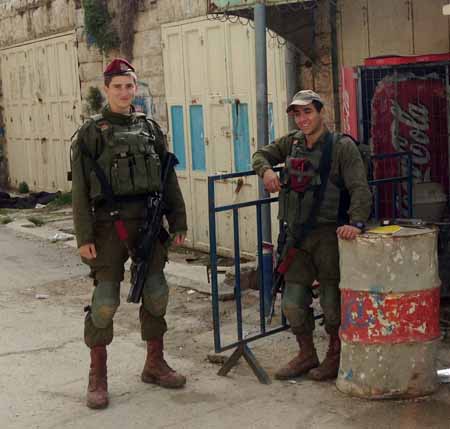 the hills above… it’s weird and fascinating, because these inimical populations are completely intertwined, sometimes on different floors of the same house. And no one was bothering me — some people didn’t return my hellos, but the soldiers were consistently polite and cheerful, and when I asked if I could take their picture they said, “Sure, you can do anything you want…”
the hills above… it’s weird and fascinating, because these inimical populations are completely intertwined, sometimes on different floors of the same house. And no one was bothering me — some people didn’t return my hellos, but the soldiers were consistently polite and cheerful, and when I asked if I could take their picture they said, “Sure, you can do anything you want…”
So then I was up on the hillside above the old city and noticed, walking ahead of me, a couple of white-haired women whom a life in Cambridge, Massachusetts, had equipped me to instantly recognize as committed social activists — in another context I would have asked if they knew my mom. So I went over, said hello, and asked if they could help me understand what I was looking at. They turned out to be Israelis from a group called Machsom Watch (Checkpoint Watch) who had been coming to Hebron a few times a year for 15 years, acting as observers and writing reports on how the situation was changing.
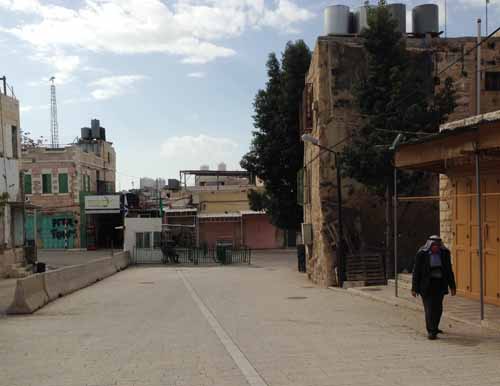 They were very helpful, telling me how things were different in various periods, and we gradually made our way down the hill and back to the street in front of the Ibrahimi Mosque, which I had already walked up and down at least three times. They introduced me to a Palestinian man who runs a souvenir shop there, and while we were chatting the Israeli soldiers who were guarding that end of the street came over from the checkpoint and asked the women who they were and what they were doing. Then the women left to catch their ride back to Tel Aviv, and I had a coffee in the souvenir shop and headed back towards that street in front of the mosque, which was also the street to the hostel where I was staying…
They were very helpful, telling me how things were different in various periods, and we gradually made our way down the hill and back to the street in front of the Ibrahimi Mosque, which I had already walked up and down at least three times. They introduced me to a Palestinian man who runs a souvenir shop there, and while we were chatting the Israeli soldiers who were guarding that end of the street came over from the checkpoint and asked the women who they were and what they were doing. Then the women left to catch their ride back to Tel Aviv, and I had a coffee in the souvenir shop and headed back towards that street in front of the mosque, which was also the street to the hostel where I was staying…
…but this time, the soldiers didn’t just wave me past. They asked where I was from, and took my passport, and told me to stand back while they first examined the identification of a young Muslim woman and asked her a lot of questions. Then they waved her past and asked if I was with those two women 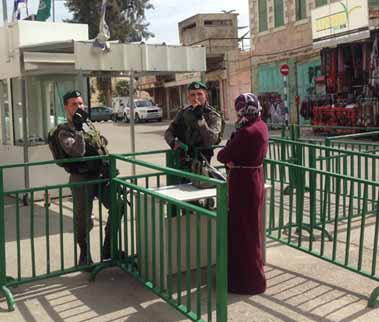 they’d seen me with. I said no, and they asked where I was going. I said I was going back to my hostel. They asked, “You are a Jew?” I said yes. They said, “You cannot go here.”
they’d seen me with. I said no, and they asked where I was going. I said I was going back to my hostel. They asked, “You are a Jew?” I said yes. They said, “You cannot go here.”
Now, the division of Hebron is complicated even by Israeli/Palestinian standards: the soldiers are very clearly protecting the Israeli settlers from the Palestinian locals, but the current separation followed the killing of 29 Muslims by a Jewish/American/Israeli settler in that very mosque 24 years ago, and since then the mosque part of the building has been kept separate from a smaller section that functions as a synagogue — which is what it was back in Herod’s day, and it has also been a Christian Church, and basically it’s holy to everybody and is the city’s main tourist attraction and I’d already visited it earlier that morning… but for religious purposes, it is firmly divided into Muslim and Jewish sections, with separate entrances on opposite sides to prevent any possible clashes. So OK, there was a logical reason to prevent me, as a Jew, from entering the Muslim side… but, as I say, I’d already walked back and forth down this same street several times, passing this same checkpoint, and had already visited the mosque, and no one had shown the slightest interest in my religious or ethnic identity.
So I explained that I wasn’t going to the mosque, and anyway was not religiously Jewish, and had been wandering back and forth through this same checkpoint for two days, and was just going to my hostel. One of them called their superior on their field phone, chatted briefly, then came back and said, “You are a Jew, you can’t go here.”
I said, “Suppose I say I’m just an American tourist, and not a Jew?”
By now the taller soldier was getting annoyed. Leaning forward, he aggressively snapped: “Are you a Jew?!”
I said, “My great-grandparents were Jewish, but I’ve never been religious… so if I say I’m not Jewish can I go through?”
He called again to ask his superior, then said, “If you are Muslim or Christian, you can go here, but Jews have to go there…” gesturing to the other entrance.
I said, “But I’m not going in this building at all, I’m just walking back down the street to the old city.”
He said, louder than ever, “Are you a Jew? If you are a Jew you can’t go here.”
The conversation was obviously not going to change, I had no particular reason to go back the same way I’d come, and I was not accomplishing anything by continuing to argue. So I decided to explore the alternatives: “OK, how else can I get back to the old city?” The taller soldier gestured that I could go around through the Jewish area, or around the back of the mosque.
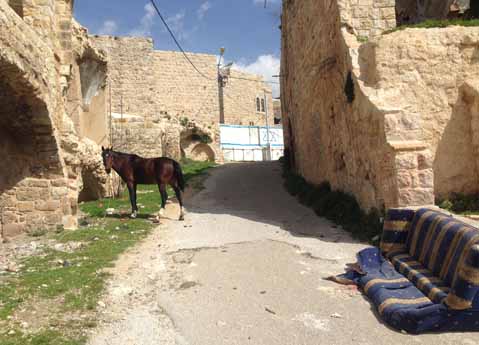 I walked up the dirt road that led behind the mosque, into a thoroughly Arab neighborhood, wandered up dirt roads and down alleys, asked a couple of people for directions, and eventually wound my way down to the other end of the same street in front of the mosque… where another pair of soldiers who hadn’t seen me consorting with elderly Israeli peace observers waved me through with a smile. So that was that. I walked back through the market, bought a handful of almonds and a falafel sandwich with roast eggplant, hot pepper sauce, and pickled vegetables, retrieved my guitar and pack from the hostel, and caught a minibus to Bethlehem.
I walked up the dirt road that led behind the mosque, into a thoroughly Arab neighborhood, wandered up dirt roads and down alleys, asked a couple of people for directions, and eventually wound my way down to the other end of the same street in front of the mosque… where another pair of soldiers who hadn’t seen me consorting with elderly Israeli peace observers waved me through with a smile. So that was that. I walked back through the market, bought a handful of almonds and a falafel sandwich with roast eggplant, hot pepper sauce, and pickled vegetables, retrieved my guitar and pack from the hostel, and caught a minibus to Bethlehem.
Make of it what you will.
